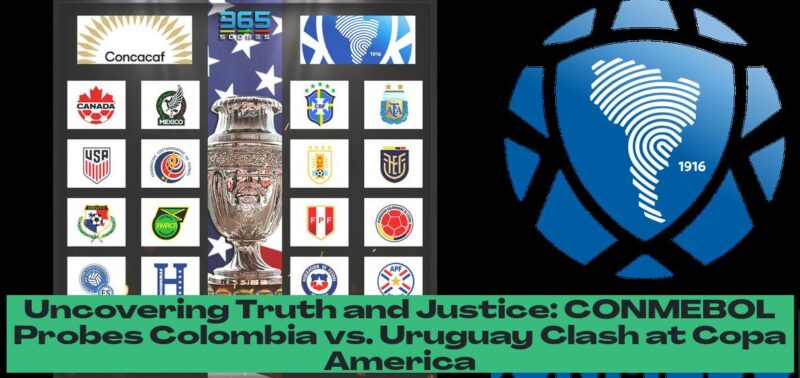CONMEBOL Investigates Copa America Brawl: A Deeper Dive into the Uruguay vs. Colombia Incident
The 2024 Copa America, a prestigious tournament featuring the best South American football teams, was marred by a shocking incident following the semi-final clash between Uruguay and Colombia. This heated encounter, which saw Colombia emerge victorious with a 1-0 win in Charlotte, North Carolina, ended in a chaotic brawl involving Uruguayan players and Colombian fans. This event has sent shockwaves through the footballing world, prompting CONMEBOL, the governing body of South American football, to launch a thorough investigation into the altercation.
The tension between the two teams had been palpable throughout the match, with numerous fouls and heated exchanges on the field. However, the violence that erupted after the final whistle was completely unexpected. Videos circulating on social media captured the moment Uruguayan players, frustrated by the loss, stormed into the stands and engaged in a physical confrontation with Colombian supporters. Among the players involved in the melee were prominent figures like Darwin Núñez and Ronald Araújo, stars for Liverpool and Barcelona respectively.
The incident has sparked widespread condemnation from footballing authorities and fans alike. Many have expressed outrage at the players’ aggressive behavior, arguing that they should have shown more restraint and professionalism. Others have criticized the security arrangements at the stadium, suggesting that they were inadequate to prevent such a violent outburst. The incident has also raised concerns about the growing problem of fan violence in football, a trend that has plagued the sport for many years.
The incident has also cast a shadow over Uruguay’s overall performance in the tournament. Although they had reached the semi-finals, their quest for the Copa America title was ultimately thwarted by the aggression of their players. The Uruguayan Football Association (AUF) has condemned the actions of their players, stating that they will cooperate fully with the CONMEBOL investigation.
However, some Uruguayan players have defended their actions, arguing that they were provoked by the Colombian fans. Striker Luis Suárez, a veteran of the Uruguayan National Team, has publicly defended his teammates’ decision to enter the stands, claiming that they were subjected to verbal abuse and threats from the Colombian supporters. Suárez’s comments have further intensified the debate surrounding the incident, with many arguing that his justification is unacceptable.
- A chaotic brawl erupted between Uruguayan players and Colombian fans following the Uruguay vs. Colombia semi-final clash at the 2024 Copa America in Charlotte, North Carolina.
- CONMEBOL, the governing body of South American football, has launched an investigation into the altercation to address the shocking incident that marred the prestigious tournament.
- The tension between Uruguay and Colombia was palpable throughout the match, with numerous fouls and heated exchanges on the field leading to unexpected violence after the final whistle.
- Prominent players like Darwin Núñez and Ronald Araújo were involved in the physical confrontation with Colombian supporters, sparking widespread condemnation from footballing authorities and fans.
- The incident has raised concerns about fan violence in football and highlighted issues with security arrangements at stadiums, prompting calls for more restraint and professionalism from players.
- Uruguay’s performance in the tournament was overshadowed by the brawl, leading to condemnation from the Uruguayan Football Association (AUF) while some players defended their actions citing provocation by Colombian fans.
- Veteran striker Luis Suárez publicly supported his teammates’ decision amid criticism of their aggressive behavior during the post-match confrontation.
CONMEBOL’s Investigation: A Search for Truth and Justice
CONMEBOL, the governing body of South American football, has taken a strong stance against the incident. In a statement released on Thursday, they declared that they had opened an investigation “to understand the sequence of events and the responsibilities of those involved in the acts of violence that occurred at the end of the match.” The investigation will focus on determining the exact causes and contributing factors that led to the brawl. CONMEBOL will also analyze the security measures in place at the stadium and assess whether they were sufficient to prevent such incidents.
The investigation will likely involve reviewing footage from the match and gathering statements from players, officials, and witnesses. The findings of the investigation will be used to determine appropriate disciplinary actions against those found to have broken the rules. These penalties could include fines, suspensions, or even bans from future competitions.
The investigation is crucial for restoring order and ensuring that future Copa America tournaments are conducted in a safe and fair environment. CONMEBOL has a responsibility to act decisively and send a clear message that violence will not be tolerated in football. The outcome of this investigation will have far-reaching implications, setting a precedent for how similar incidents are handled in the future.
The Bigger Picture: Addressing Fan Violence in Football
The Uruguay vs. Colombia incident is a stark reminder of the ongoing issue of fan violence in football. While many fans are passionate and dedicated supporters of their teams, a small minority engage in aggressive and destructive behavior that threatens the safety of players, officials, and fellow supporters. This type of behavior is unacceptable and must be addressed.
Football authorities are constantly seeking ways to combat fan violence. Measures include increased security at stadiums, stricter punishments for perpetrators, and initiatives to promote responsible fan behavior. However, tackling this issue requires a multifaceted approach that involves collaboration between football clubs, governing bodies, and law enforcement agencies.
One important aspect of addressing fan violence is promoting a culture of respect and sportsmanship among fans. Clubs and leagues can play a role in educating fans about the importance of fair play and responsible behavior. They can also work with fan groups to create a positive and inclusive environment in stadiums. By fostering a culture of respect, fans can be encouraged to celebrate their passion for the game in a peaceful and constructive manner.
Ultimately, addressing fan violence requires a concerted effort from all stakeholders in the footballing world. By working together, we can create a safer and more enjoyable environment for everyone involved in the beautiful game.
The Road Ahead: Lessons Learned and Future Implications
The Uruguay vs. Colombia incident serves as a cautionary tale for all involved in football. It highlights the need for constant vigilance and proactive measures to prevent such incidents from occurring again. CONMEBOL’s investigation will be closely monitored by football fans and authorities worldwide, with the hope that it will lead to concrete steps to improve security and prevent future outbreaks of violence.
The incident also underscores the importance of fostering a culture of respect and responsibility among players. Players are role models for young fans and should strive to conduct themselves with integrity and professionalism, both on and off the field. This means showing restraint in the face of provocation and setting an example of fair play and sportsmanship.
The Copa America is a prestigious tournament that celebrates the passion and talent of South American football. It is vital that future tournaments are conducted in a safe and secure environment, allowing fans to enjoy the beauty and excitement of the game without fear of violence or disruption. The Uruguay vs. Colombia incident should serve as a catalyst for change, prompting all stakeholders to work together to ensure that the Copa America and other football competitions remain a celebration of the sport, not a platform for violence.









